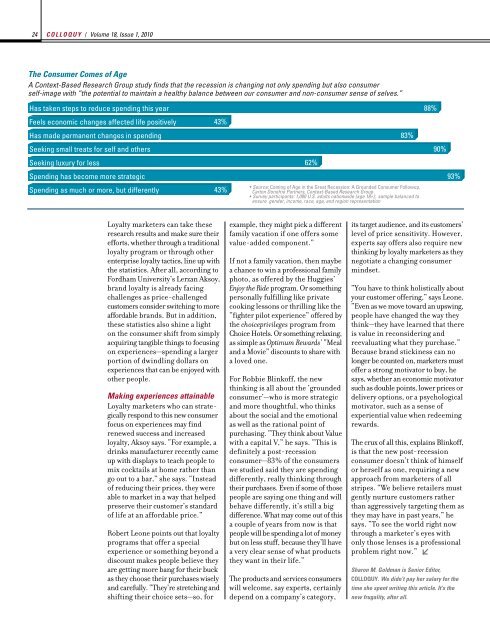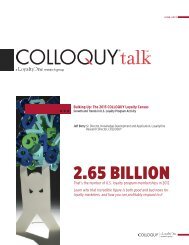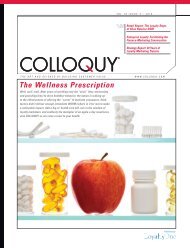Transformers - Colloquy
Transformers - Colloquy
Transformers - Colloquy
You also want an ePaper? Increase the reach of your titles
YUMPU automatically turns print PDFs into web optimized ePapers that Google loves.
24<br />
C O L L O Q U Y / Volume 18, Issue 1, 2010<br />
The Consumer Comes of Age<br />
A Context-Based Research Group study finds that the recession is changing not only spending but also consumer<br />
self-image with “the potential to maintain a healthy balance between our consumer and non-consumer sense of selves.”<br />
Has taken steps to reduce spending this year 88%<br />
Feels economic changes affected life positively 43%<br />
Has made permanent changes in spending 83%<br />
Seeking small treats for self and others 90%<br />
Seeking luxury for less 62%<br />
Spending has become more strategic 93%<br />
Spending as much or more, but differently 43%<br />
Loyalty marketers can take these<br />
research results and make sure their<br />
efforts, whether through a traditional<br />
loyalty program or through other<br />
enterprise loyalty tactics, line up with<br />
the statistics. After all, according to<br />
Fordham University’s Lerzan Aksoy,<br />
brand loyalty is already facing<br />
challenges as price-challenged<br />
customers consider switching to more<br />
affordable brands. But in addition,<br />
these statistics also shine a light<br />
on the consumer shift from simply<br />
acquiring tangible things to focusing<br />
on experiences—spending a larger<br />
portion of dwindling dollars on<br />
experiences that can be enjoyed with<br />
other people.<br />
Making experiences attainable<br />
Loyalty marketers who can strate -<br />
gically respond to this new consumer<br />
focus on experiences may find<br />
renewed success and increased<br />
loyalty, Aksoy says. “For example, a<br />
drinks manufacturer recently came<br />
up with displays to teach people to<br />
mix cocktails at home rather than<br />
go out to a bar,” she says. “Instead<br />
of reducing their prices, they were<br />
able to market in a way that helped<br />
preserve their customer’s standard<br />
of life at an affordable price.”<br />
Robert Leone points out that loyalty<br />
programs that offer a special<br />
experience or something beyond a<br />
discount makes people believe they<br />
are getting more bang for their buck<br />
as they choose their purchases wisely<br />
and carefully. “They’re stretching and<br />
shifting their choice sets—so, for<br />
• Source: Coming of Age in the Great Recession: A Grounded Consumer Followup,<br />
Carton Donofrio Partners, Context-Based Research Group<br />
• Survey participants: 1,000 U.S. adults nationwide (age 18+); sample balanced to<br />
ensure gender, income, race, age, and region representation<br />
example, they might pick a different<br />
family vacation if one offers some<br />
value-added component.”<br />
If not a family vacation, then maybe<br />
a chance to win a professional family<br />
photo, as offered by the Huggies’<br />
Enjoy the Ride program. Or something<br />
personally fulfilling like private<br />
cooking lessons or thrilling like the<br />
“fighter pilot experience” offered by<br />
the choiceprivileges program from<br />
Choice Hotels. Or something relaxing,<br />
as simple as Optimum Rewards’ “Meal<br />
and a Movie” discounts to share with<br />
a loved one.<br />
For Robbie Blinkoff, the new<br />
thinking is all about the ‘grounded<br />
consumer’—who is more strategic<br />
and more thoughtful, who thinks<br />
about the social and the emotional<br />
as well as the rational point of<br />
purchasing. “They think about Value<br />
with a capital V,” he says. “This is<br />
definitely a post-recession<br />
consumer—83% of the consumers<br />
we studied said they are spending<br />
differently, really thinking through<br />
their purchases. Even if some of those<br />
people are saying one thing and will<br />
behave differently, it’s still a big<br />
difference. What may come out of this<br />
a couple of years from now is that<br />
people will be spending a lot of money<br />
but on less stuff, because they’ll have<br />
a very clear sense of what products<br />
they want in their life.”<br />
The products and services consumers<br />
will welcome, say experts, certainly<br />
depend on a company’s category,<br />
its target audience, and its customers’<br />
level of price sensitivity. However,<br />
experts say offers also require new<br />
thinking by loyalty marketers as they<br />
negotiate a changing consumer<br />
mindset.<br />
“You have to think holistically about<br />
your customer offering,” says Leone.<br />
“Even as we move toward an upswing,<br />
people have changed the way they<br />
think—they have learned that there<br />
is value in reconsidering and<br />
reevaluating what they purchase.”<br />
Because brand stickiness can no<br />
longer be counted on, marketers must<br />
offer a strong motivator to buy, he<br />
says, whether an economic motivator<br />
such as double points, lower prices or<br />
delivery options, or a psychological<br />
motivator, such as a sense of<br />
experiential value when redeeming<br />
rewards.<br />
The crux of all this, explains Blinkoff,<br />
is that the new post-recession<br />
consumer doesn’t think of himself<br />
or herself as one, requiring a new<br />
approach from marketers of all<br />
stripes. “We believe retailers must<br />
gently nurture customers rather<br />
than aggressively targeting them as<br />
they may have in past years,” he<br />
says. “To see the world right now<br />
through a marketer’s eyes with<br />
only those lenses is a professional<br />
problem right now.”<br />
Sharon M. Goldman is Senior Editor,<br />
COLLOQUY. We didn’t pay her salary for the<br />
time she spent writing this article. It’s the<br />
new frugality, after all.




